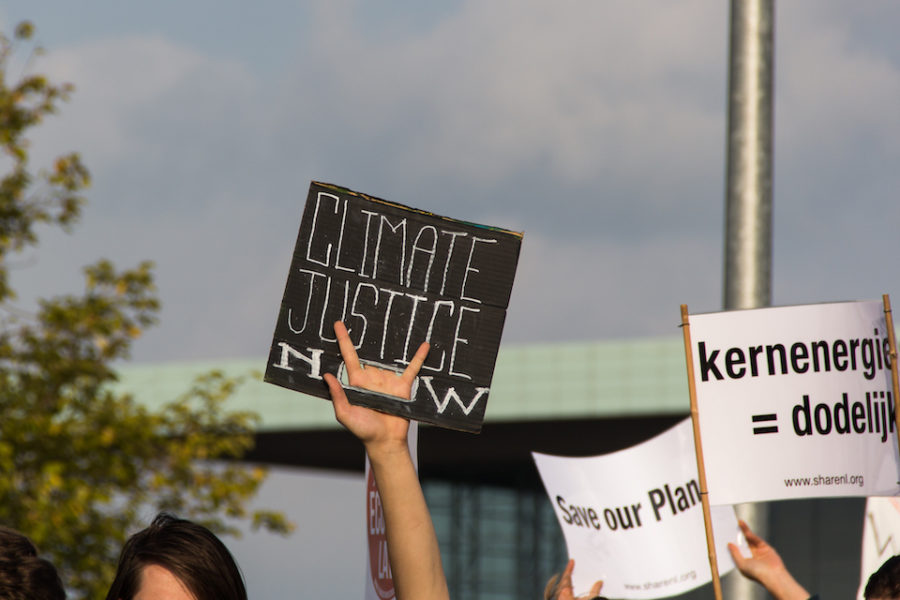11 Dec 2024

Tired Earth
By The Editorial Board

“Everybody is too busy writing to read, too busy publishing to debate” - Rutger Bregman’s quote in ‘Utopia for Realist’ is also applicable in the case of climate justice. Hundreds and thousands of documents will appear on your screen as soon as you search the term online, but you are sure to get a lower number of returns if you look for the voice of the victims of climate injustice.
The climate-vulnerable communities, the people on the ground are still left under the shadow of scientists, researchers, academia and of course the policymakers. In most cases, we think ‘global’ as soon as the term ‘climate justice’ comes up.
Bangladesh is one of the biggest examples of a country suffering from climate injustice. The country is at the top of the list of the most vulnerable countries, and it is paying the highest price in terms of climate change, despite being responsible for an insignificant share of the carbon dioxide emitted during the last fifty years. Injustice has been evident from the lack of accountability of the global polluters. It is a dire scenario where the global top emitters are moving far away from any sort of accountability and responsibilities regarding the commitments they made.
In a similar way, we are yet to focus on the injustice on the ground level and to highlight how the communities suffer from these injustices in their daily lives. The injustice is strongly rooted in unjust decision making, unjust models and systems, and unjust accountability on the ground in the context of climate change.
“See, we, the women, have hardly any scope to share our thoughts, our choices and preferences; neither at home nor outside,” says Mosammat Sufia Khatun, a community leader from the coastal area of Morrelganj, Bagerhat in Bangladesh.
“We have grown up in a culture and practice of ‘unjust’ decision making processes which have been almost ‘normal’ in our work and life. This situation has become worse in the context of climate change as we, the women, despite being affected disproportionately, have limited space when it comes to climate change adaptation planning and concrete action on the ground. Men usually make all the decisions – it is strongly embedded and rooted in our patriarchal society and reflected in our political culture,” she said. These unjust decision-making practices for climate action not only discriminate against the excluded groups in the society but also, in reverse, favour the power holders in achieving more gains, on the other hand.
Abdul Jalil, a smallholder farmer from Koyra Sadar union in Koyra sub-district, reveals both sides of the coin. “It’s not true that climate change hurt everyone. It benefitted a group of people in the community. Who are they? The powerful and the wealthy.”
Since Aila in 2009, the embankment here has been breached several times and has been left unattended year after year. It gets damaged time and again; most people say because of cyclones and tidal surge; but Abdul Jalil reveals a hidden fact: “It’s because of us, it’s because of our greed. The powerful have capitalized on it and widened the areas for shrimp farming – sadly being backed by the support from local leaders and policymakers. In the midst of all this, we, the poor, have become poorer; the marginalized have become migrants.”
He pointed out that the existing unjust system and practices contribute to the inequality between the losers and gainers at the grassroots level. Climate actions and finance, in most cases, are led by greedy people in positions of power, leaving the voice of the oppressed unheard. It is complete injustice that the climate-vulnerable communities on the ground have limited space to benefit from in the current structure and system, whereas the gainers or the powerful capitalize on social and power dynamics to influence the decision making in their favour.
Interestingly, injustice includes different dynamics. As the embankment has been discussed earlier, let’s shed some light on it from a different angle. It is evident that climate change has an impact on sea-level rise and the increasing intensity of cyclones. This causes high tidal surges breaching the embankments regularly. Over the decades, the community from the southwest coast in the country has been raising their voices for a single demand - ‘We need the embankment, we don’t need relief’.
However, the local development plan and national development plan do not take care of it, the NGOs still go with the traditional approach of relief and recovery, while the civil society also has become toothless in this regard – none of them has been brave enough to come out and support the agenda boldly. They prefer working in their comfort zones; not taking strict stances to challenge the people in power; dealing with surface-level agenda rather than engaging the root causes. So, the concern finally comes down to whom and how to raise the issue of climate justice.
Another one of the dynamics can be observed if the spotlight is put on a slightly upper level. “The mega project of embankment construction is going on in my territory, but I do not know what the project is for, how it has been designed and who has been consulted,” said Zonaidur Rahman, the Union Parishad Chairman of Godaipur Union in Paikgacha sub-district in December 2020 in response to a question about climate financing.
This is a common scenario in climate financing as the projects are being designed, developed, and implemented centrally by the ministries or departments where the local voices are hardly addressed. Such an unjust model of climate financing promotes the culture of depriving local voices, disrespecting traditional knowledge and culture and ultimately resulting in injustice on the ground.
Source : dhakatribune.com
Comment